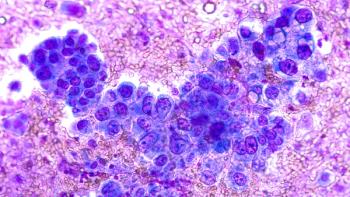
Genomic Prostate Score Assay Associated With Long-term Outcomes
A recently published 20-year study suggests that results of the Oncotype DX Genomic Prostate Score are associated with the risk of long-term outcomes in patients with localized prostate cancer.
A recently published 20-year study suggests that results of the
For patients with newly diagnosed prostate cancer, active surveillance (AS) is an increasingly popular option over immediate treatment, but making initial treatment decisions can be difficult without an understanding of the long-term risks presented by a patient’s particular disease. Calculating risk based on clinical factors alone is imperfect, so authors of the new study aimed to determine whether utilizing the GPS could help inform treatment decisions. The GPS is now the only genomic test for prostate cancer with 20-year outcomes.
Researchers analyzed GPS results assayed from radical prostatectomy (RP) tissue compared with the risk of DM and PCSM in the 20 years following RP. The overall cohort included 2641 patients treated between 1987 and 2004, and a stratified cohort sample of 428 patients with evaluable primary Gleason pattern in prostatectomy tissue was analyzed for the study. Low- and intermediate-risk patients made up most of the cohort (55% and 35%, respectively). Patients whose disease was Gleason grade group 3 or higher were considered high grade at RP, and high stage was defined as disease that had spread outside the prostate.
The GPS results, preoperative prostate-specific antigen (PSA) levels, clinical stages, and biopsy grades were used as covariables in the analysis. To mitigate overoptimism of effect estimates involving the GPS test, researchers corrected all estimates using the GPS test as a covariable for regression of the mean (RM) and reported false discovery rates instead of P values.
At 20 years of follow-up (median 15.5 years), the results of GPS assays seemed to be significantly associated with DM and PCSM, with an RM-corrected hazard ratio (HR) for GPS results per 20 units of 3.67 (95% CI, 2.34-6.27) for DM and 4.37 (95% CI, 2.22-11.23) for PCSM in the univariate analysis. Reporting the HR per 20 GPS unit increase “approximated the difference between the average GPS value in the highest 25% and the average GPS value in the lowest 25% of patients based on the GPS value distribution from previous studies,” the authors explained.
In the multivariate analysis, GPS score still seemed highly associated with DM (HR, 2.24; 95% CI, 1.49-3.53) and PCSM (HR, 2.30; 95% CI, 1.45-4.36). There was a low risk of both outcomes with a GPS result of less than 20, and a large increase when GPS results were higher than 40 in the RM-corrected estimated of absolute risk. In regard to clinical variables, only Log2PSA and high stage remained significantly associated with DM, and only Log2PSA remained significantly associated with PCSM.
Studies noted that 2 limitations were changes in standardized biopsy grading and stage migration since patients were initially enrolled (although all specimens were reviewed by an expert genitourinary pathologist after the majority of substantive changes in prostate cancer grading) and that the analysis should be considered exploratory, since the GPS test was developed in this cohort.
They concluded that the information gleaned from the GPS test could be a valuable tool for those considering AS, and that further studies are warranted to validate their findings.
“With long-term follow-up, the GPS test appears to be associated with both DM and PCSM and improves the accuracy of models containing clinical variables alone,” they wrote. “These findings suggest that genomic changes in the tumor tissue, quantified by the GPS test, provide additional biological insight into the long-term risk of DM and PCSM.”
Reference
Brooks MA, Thomas L, Magi-Galluzzi C, et al. GPS assay association with long-term cancer outcomes: twenty-year risk of distant metastasis and prostate cancer–specific mortality. JCO Precis Oncol. Published online February 24, 2021. doi:10.1200/PO.20.00325
Newsletter
Stay ahead of policy, cost, and value—subscribe to AJMC for expert insights at the intersection of clinical care and health economics.









